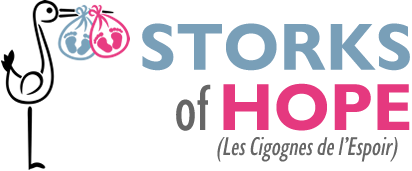Having a baby at 40: interview with Anne Lise Pernotte, author and blogger on late parenthood

Hello Anne-Lise. What is your educational and professional background?
I studied languages and business at university and worked for a few years in the export department of a cosmetics company. But I quickly gave it all up to follow my passion for music! I was a bassist with the rock band Daisybox for 10 years, signed to a record label. Then my musical adventures came to an end and I fell into the digital world by chance, working for the website côtébébé. Today I'm a journalist and web content creator, mainly in the parenting sector. I'm in charge of the côtébébé webzine and I'm developing the ‘having a baby at 40’ channel.
You had a child at the age of 40. Why did you wait so long?
At the age of 30, I wasn't ready to be a mother. I loved my life as a musician, and the question of motherhood didn't arise, despite the social pressure. I simply waited until I wanted to, knowing that I was also running the risk of not being able to have children. But it was important for me not to do things in response to societal norms.
Did you experience any particular physiological difficulties?
No, not particularly. I had the classic post-natal symptoms, with bleeding and bladder weakness for a few weeks, but I soon got over it. Incidentally, I'd like to take this opportunity to say that the after-effects of childbirth have little to do with age according to the experts, but rather with the way you look after your body in general, and your perineum in particular, in the years leading up to pregnancy.
How did your family and friends react to your pregnancy? Did you receive any negative comments?
I haven't really had any comments about my late motherhood, it's been well received. But when I did the research to co-write ‘Having a child at 40 (or almost)’, I discovered that I was pretty lucky.
A lot of older mothers’ face comments like: “your children will have old people as parents!”, “you're going against nature and nature will take its revenge”, “you're really selfish”, ’you've got three children, what's the need to have a 4th?”
But I think the key is to simply stand by your choice, because there are no right or wrong ways of doing things!
Before you became pregnant, did you experience any social pressure from people close to you or in your professional environment about the fact that you didn't yet have a child?
Yes, of course! I'd been in a relationship for a while and I didn't have children, and the years went by without anything happening. For a lot of people, that was very strange, even incomprehensible... How could you go through life without having children? So yes, between the ages of 30 and 38, I was entitled to some awkward, but rarely nasty, comments like “But you're going to grow old alone”, “it'll be too late”, “you'll regret it’...” I found it quite distressing. Around the age of 38 or 39, as my desire to have a child began to manifest itself, the comments started to die down, and I felt that I was falling into another category. At the age of 40, just as I was starting my pregnancy, someone said to me “Oh well, you've made your choice anyway, you don't want a child...” I felt like laughing, but I couldn't say anything because I hadn't passed the 3-month mark. Once again, I felt that I didn't fit in, as if I'd missed the window to have a baby, which is obviously between 25 and 35...
What advice can you give to women who want to wait to have children but are afraid of social pressure?
Above all, don't give in to social pressure! Planning to have children is a very personal thing. It's not other people who are going to bring up your children, it's you! So you might as well feel ready.
There is also a solution that puts less pressure on you, but it is not yet CHECK UK fully authorised and practised in France: egg freezing. It's a bit of a gamble on the future, a safety net, if you don't want to have children at 30 or haven't yet met the right person.
Article published by the not-for-profit organisation ‘Les Cigognes de l'Espoir’. All rights reserved.

